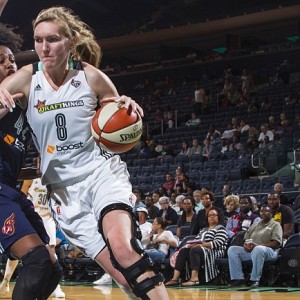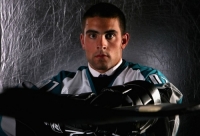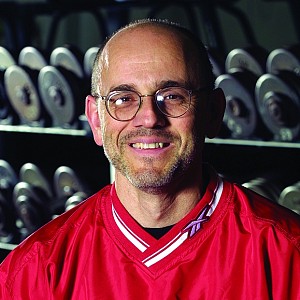Training Roundtable - Part 2 - Mike Boyle, Eric Cressey, Brijesh Patel, Jeff Oliver
May 26, 2010 John
This is Part 2 of the Roundtable Discussion with Mike Boyle, Jeff Oliver, Brijesh Patel, and Eric Cressey. Part 1 was included in the May edition of articles. If you didn’t read part 1, definitely do so before checking out part 2. Great information from four unbelievable coaches.
I feel like healthy discussion and debating should be candid - so, in the interest of great material (in my opinion), I thought gathering some of the brightest minds I know and talking shop would be enlightening. I sent a series of questions to four friends/colleagues - with the stipulation that they answer the questions without consulting each other, with the hope of contrasting the styles of four guys who just flat out get it done, albeit each in their own way.
The first is Jeff Oliver, the Director of Strength and Conditioning at Holy Cross. He has been a tremendous mentor to me, and is a great friend. Jeff is hands down one of the smartest guys I know - but would never let you know it. Above all, he is a one of the best coaches I know. He has an impressive “coaching tree”, and has been a great role model to many people in the field - the mark of a guy who has made a huge impact in the field of strength and conditioning.
The second is Mike Boyle - love him or hate him, the guy has been a tireless force in the advancement of the field of S+C. I’ve figured out that all the education and lecturing that he does is for that reason above all. I’ve seen it in how he structures things at Mike Boyle Strength and Conditioning in Boston - if you work there, learning and getting better is not an option - it is mandatory. Even if you don’t agree with what he says or writes, it sparks healthy debate that eventually leads to overall improvement as a field. The guy knows what he is doing, and has been doing it well for a long time. And most important: he still trains athletes all the time!
The third is Brijesh Patel - Director of S+C at Quinnipiac College in Hamden Connecticut. The most organized, focused person I know - period. A great coach, and an even better person. Coach B’s principles and thought processes have deeply impacted the way I view training, because they make a ton of sense and are deeply rooted in practice - tried and true, usually by B himself. A great mind who again is a tremendous contributor to the field.
The fourth is Eric Cressey - founder of Cressey Performance. Eric is one of the brightest young minds in the field of strength and conditioning - again, a guy whose principles were developed in the laboratory - training himself, and training many others. Again, Eric is among the best at disseminating high quality, practical educational material to the masses, raising the overall quality of the entire field.
All great minds; all guys who practice their craft daily; all guys with faces perfect for print (much like yours truly).... The take home point: these guys all get results, and all in their own unique way. Read this piece with that in mind: improving your own philosophies and practices - not necessarily emulating any one!! Grab a beer (yes beer - not a protein shake) and enjoy.....
1. What are your feelings regarding training for overall athleticism vs. sport specificity?
JO:
I think you can train specifically for sport, not for a sport. The evidence is overwhelming that imbalances and eventually injuries occur in those athletes who are year round in a particular sport. To add to those imbalances in training seems obviously wrong. It is a constant battle with parents and athletes alike. As coaches we need to and can spin each exercise as "specific".
BP:
Training for overall athleticism should be the priority of strength and conditioning coaches when training athletes. Our job is to make better athletes; sport coaches then use sport specific drills to make their players better for their sport. Making better athletes helps the athletes by putting them in a better position to make a play.
MB:
Sport specificity is a waste of time if you mean trying to improve on field or court performance with imitative stuff in the weightroom.
EC:
Nowadays, we have a lot of young soccer players, baseball players, basketball players, etc. – but not nearly enough athletes.
We see a ton of young pitchers with outrageous shoulder and elbow injury histories. Usually, the injuries are a wake-up call to their parents, and they want to know how to make things right and avoid the problem in the first place. Is it a mechanical fault? A weak rotator cuff? Sure, that’s probably part of it.
More often, though, it just comes down to the fact that the kid has played 175 games for three different teams over the course of the year on top of attending showcases and college camps. It isn’t just about him destroying his body with the specificity of baseball, though; it’s also about the opportunity cost of his time. He never had the time to play other sports or train in the weight room to become a better athlete and prepare his body for specificity.
I don’t have children yet, but when I do, you can bet that he/she won’t specialize in one sport until age 17 at the earliest, won’t play for more than one team at a time, and won’t attend a single showcase. He will however, be left-handed with a hammer 12-6 curveball, and he’ll be devastatingly good-looking. And possibly a ninja.
9. What are the three most important nutritional supplements, if any, in your opinion?
EC:
Fish Oil, Vitamin D, and a good low-carb protein powder.
And, if you are anyone on this roundtable other than Ollie, probably Rogaine or at the very least, a good can of spray-on hair.
BP:
Protein powder, Fish Oil, and a Multivitamin supplement.
JO:
Pre and post workout high carbohydrate, moderate protein liquid shakes (chocolate milk). Post competition beer, and high protein shakes between meals. Obviously all of this could and should be accomplished with whole food, but you asked about supplements. You could throw creatine into the mix as well.
MB:
10. My guilty pleasure is _____.
JO: There is no such thing. Anything that makes you feel guilty really isn't a pleasure for very long.
MB: Beer. (Editor’s note: Amen! In line with Ollie’s post competition beer supplementation.)
BP: Buffalo Wings! (perfect compliment to a frosty beer....)
EC: Spike (the energy drink). I drink too much off it. I blame entrepreneurship for that.
11. Who has been the biggest influence in/on your your career? Point being: everyone should have role models/mentors - I have learned a ton from each of these professionals.
MB:
Probably my father. I realize more and more as I age how great an influence he was. He was a high school teacher, principal, and won championships coaching basketball ( a game he never really played).
BP:
Mike Boyle - he has taught me to question things and to always look for a better way. He has a tremendous effect on the entire fitness field and I feel fortunate enough to have worked for him and to know him on a personal level.
EC:
My parents, without a doubt. They provided unwavering support me when I decided to change gears and leave business school to pursue my current career path. I’ve learned a ton from so many people along the way – from other strength coaches, to rehabilitation specialists, to doctors, to the athletes themselves – but Mom and Dad definitely come first. My fiancée and business partners/staff at Cressey Performance have also been incredibly influential in more recent years.
JO:
Mike Boyle - he has taught me to question things and to always look for a better way. He has a tremendous effect on the entire fitness field and I feel fortunate enough to have worked for him and to know him on a personal level.
1. He picked me up out of the coal-ash pile of complacent athletes and taught me how to train.
2. He picked me out of the pile of aimless former athletes and made me a coach....and fed me and gave me a place to live. He literally gave me the shirt off his back. (Jeff lived with Mike and his wife Cindy for a length of time while going to school/working for Mike - he is serious).
3. He did all of this because he was a friend and never asked for a thing in return.
4. When I worked for Mike he gave away the store to a lot of kids, and adults for that matter who needed help, because it was the right thing to do.
5. Character. He is never afraid of the truth and will always raise his hand and speak up unlike the rest of us cowards.
6. Quality. Mike could make twice as much money if he sacrificed quality like so many in the profession. The fact that he doesn't train 10 year olds on principle speaks volume for his character.
7. He enjoys life.
Brijesh, because he taught me that:
- Anything is possible if you put your mind to it and stay the course based on your principles. He is a 5'2" Indian American that certainly doesn't command respect, but gets more respect from his athletes then any coach I have ever met.
- Stick to your own personal style. All coaches are different. Don't try to be someone else. I could never get away with coaching like he does and I don't think he could get away with my style. Our experiences have shaped us and we have to utilize them to be good coaches. I think too many coaches try to be like someone else and pay a heavy price for it in loss of respect from their athletes.
- He taught me that hard work, self discipline and preparation are the keys to living a stress free life. Of course I haven't learned it very well, but he taught it and lived it. He left our facility a better place and left me a better person.
- He taught me that being straight forward, even when it hurts is always the right way to go.
12. Please give two to three reasons to squat and two to three not to squat. Be sure to give both!
BP:
The squat is a great multi-joint exercise used:
- 1. To develop lower body strength.
- To assess functional flexibility
The squat can be replaced by single leg work when:
1. The athlete doesn’t possess the functional range of motion to squat properly with load - so single leg exercise can be used to develop lower body strength.
- If the athlete has a history of back problems and axial loading is contraindicated.
JO:
To Squat:
1. It creates an atmosphere of max effort, which can’t be underestimated.
2. If you are a rower.
Not to squat:
1. Femoroacetabular Impingement - leads to lumbar dysfunction, acetabular cartilage damage, labral damage, and poor motor patterns.
2. The presence of sacroiliac dysfunction
3. The presence of compounding asymmetrical dysfunction.
Bottom line - not many athletes can squat well, and when you force them to, it ends up being a disaster.
EC:
Reasons to squat:
1. There are distinct benefits to axial loading in terms of enhancing bone density and providing a systemic effect to increase muscle mass
2. Anecdotally, the athletes who do it are bigger and faster. And, because it is versatile, you can change squat variations around to emphasize different things. A box squat recruits more posterior chain than a front squat, for instance.
3. It is difficult – and I think that far too many athletes are soft nowadays and need to learn how to do something that’s actually challenging.
Reasons not to squat:
1. We know that 80% of the population has disc bulges or herniations that exist even if they aren’t symptomatic – so axial loading may not be right for a lot of them.
2. A lot of folks have serious ankle, hip, and thoracic spine mobility deficits that make squatting unsafe for them (would lead to lumbar flexion under load). With more and more hip issues coming to the forefront – particularly in hockey, soccer, and baseball – we can likely get a comparable training effect with deadlift variations and single-leg work.
3. Bilateral exercise may not carry over to real-world performance as well as we think.
MB:
For:
-Lots of bang for the buck ( lower body strength, multi-joint)
-Easy to do with limited equipment
Against:
- Lots of low back stress
- Difficult to teach to large groups
- Not adaptable to all size athletes
13. What is the most commonly overlooked/undervalued skill in coaching?
MB:
Caring. No one cares how much you know until they know how much you care.
JO:
Connecting on a personal level while getting athletes to do exactly what you think they should do , when you think they should do it with maximal effort AND without coming across as condescending.
BP:
Holding athletes accountable and getting them to work hard every day.
EC:
I would say that it is the ability to create a motivating environment. There are a lot of knowledgeable, personable coaches out there who have absolutely no idea how to foster camaraderie with their athletes or create an environment in which athletes don’t just make themselves better; they make each other better.
I hope that you all found this as enlightening, and entertaining as I did. Now go put the info to use in your daily practice!!



